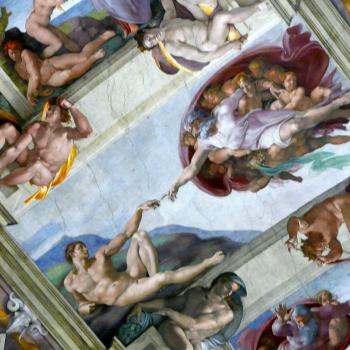According to Aquinas, grace is supernatural presence, or as James described it, "the word implanted" by God within your soul. Aquinas works out his logic on this implantation as follows (though he may be hard to follow):
According to everyday speech, grace is usually taken in three ways. First, it can mean someone's love, as we are accustomed to say that the soldier is in the good graces of the king, that is the king who looks on him with favor. Secondly, it is taken for any gift freely given, as we are accustomed to say: I do you this favor or act of grace. Thirdly, it is taken for the response to a gift given, inasmuch as we are said to be "grateful" for the gift and its benefits. Now of these three the second depends on the first, since one freely bestows something on another on account of having loved them or received them into his or her good "graces." And from the second proceeds the third, since from benefits bestowed freely or "gratis" arises "gratitude." Now if grace is understood in either the second or the third sense of the word, it will be clear that grace implies something left in the one who received it; whether the gift freely given itself or the gratitude for that gift. But as regards the first, a difference must be noted between the grace of God and human grace; for since the creature's good springs from the Divine will, that good in the creature flows from God's love, whereby He wishes the good of the creature. . . . Therefore it is clear that every love of God is followed at some time by a good caused in the creature. . . . God's grace . . . draws the creature above the condition of its nature to a participation of the Divine good.
In a nutshell, Aquinas believed that God established his wise and loving Kingdom and by his word implanted, instinctively calls his creatures toward that Kingdom and offers them the necessary assistance (grace) to get there -- should they so desire to go. In this vein Aquinas did hold that humans earn their salvation; yet remember, any meritorious act was only possible due to God's enablement. God's grace instills us with power, virtue, and spiritual gifts for our spiritual pilgrimage. Aquinas wrote, "eternal life has its inception in us, inasmuch as it causes the mind to give its assent to things that are not seen." This heavenward orientation prompts human acts of love and faith. God recognizes the inherent value of such acts and rewards them accordingly.
The Reformers roundly rejected such notions -- especially as they became corrupted over subsequent centuries. Aquinas regarded justifying faith as "assent" to humanity's natural grace-induced proclivities toward God resulting in meritorious works. However, the Reformers insisted that faith was "trust" in the meritorious works of Christ alone, which trumped humanity's natural sin-induced proclivities away from God. You do nothing to gain salvation because you can do nothing to gain salvation. Aquinas's arguments countered that anything you do to gain salvation, you do only because God by grace has endued you to do it. The difference is a nuanced one, but nevertheless critical enough to split the church.
Where is Jesus in Aquinas's journey toward a high destiny spurred on by divine word implanted? Jesus, the word incarnate, is the perfection of God's image serving for Christians as both the source and the goal, the journey's Alpha and the Omega, the author and finisher of faith. Aquinas wrote, "Our Savior Jesus Christ has shown forth the way to truth for us in himself, the way through which we by rising from the dead can reach the happiness of immortal life." Way, truth, life, future -- these are the gifts Jesus brings to human beings. Jesus the Christ, the word made flesh, revealed God and his intentions, provided intimate access to the blessings of those intentions, and saved people from the sins that obstructed their passage. Yet the effects of Jesus' life continue after his departure from earth. He instills through the written word and the sacraments the life of the Spirit, the breath of God, within the lives of his followers.
Borrowing from Aristotle, Aquinas asserted that human beings live through what they sense and touch -- thus his emphasis on the sacraments. For him the sacraments were the precise and important modes of a continuing incarnation. Because people are not angels, they need the visible and the tangible in order to comprehend the invisible. The visible and tangible aspects of the sacraments -- the bridal pair at marriage, the water of baptism, the bread and wine of the Eucharist, oil for anointing the sick -- these not only inspire but bring the power of Christ's life and death near. Sacraments are moments in the heavenward journey that draw you closer in -- they are events of grace. Aquinas wrote speaking of the Eucharist,
The effect of this sacrament ought to be considered, first of all and principally, from what is contained in this sacrament, which is Christ; Who, by his visible appearance in the world has given to the world the life of grace (Grace and truth have come through Jesus Christ -- John 1:17). So, coming sacramentally into an individual he brings about the life of grace (As the living Father sent Me, and I live because of the Father, so he who eats Me, he also will live because of Me -- John 6:57).





